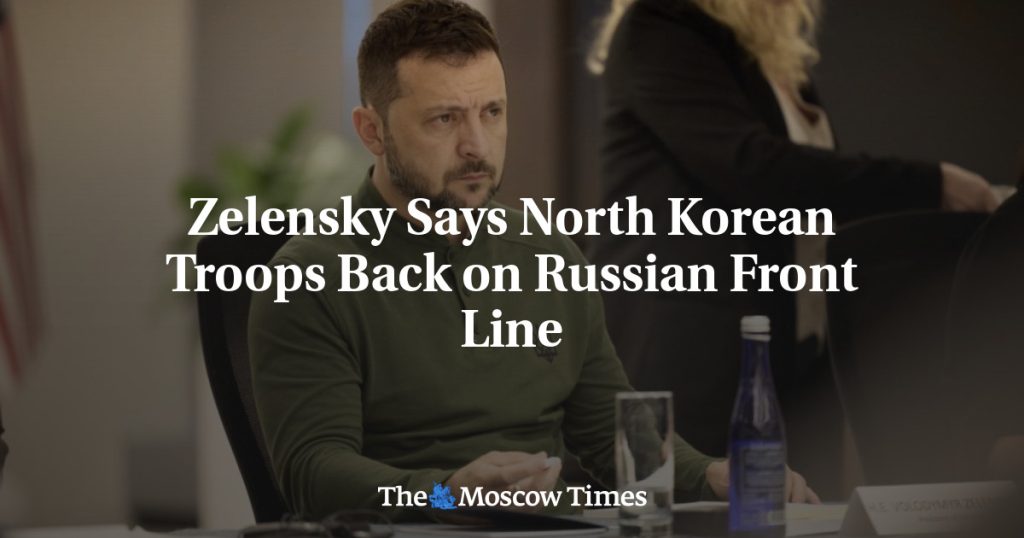North Korean Troops Return to the Front Lines in Russia’s Kursk Region
Ukrainian President Volodymyr Zelensky revealed on Friday that North Korean troops had rejoined Russian forces on the front lines in the Kursk region, following earlier reports of their withdrawal due to heavy losses. The deployment of more than 10,000 North Korean soldiers to Russia last year was reportedly aimed at bolstering Moscow’s efforts to counter a surprise Ukrainian offensive into the border region. However, their presence on the battlefield has been a subject of speculation and confusion, with Ukrainian officials noting that no direct clashes or activity involving North Korean troops had been observed for three weeks prior to Zelensky’s announcement. The Ukrainian leader confirmed that fresh assaults had taken place in the Kursk operation areas, with both Russian and North Korean forces reengaging in combat.
Zelensky also highlighted the significant losses incurred by the opposing forces, stating that "hundreds of Russian and North Korean soldiers" had been destroyed in the fighting. This statement underscores the intensity of the ongoing conflict and the escalating human cost for both sides. The return of North Korean troops to the front lines suggests that Russia may be struggling to maintain its defenses in the region, prompting it to seek additional support, despite the risks and controversies associated with involving foreign fighters.
Historical Context: Ukraine’s Offensive into Russian Territory
The Ukrainian offensive into the Kursk region, which began six months ago, marked a historic and unprecedented move. For the first time since World War II, a foreign army had crossed into Russian territory, capturing dozens of border settlements. This bold maneuver by Kyiv not only demonstrated the Ukrainian military’s capabilities but also sent a clear message to Moscow about the escalating stakes of the conflict. The incursion into Russian territory has been a significant bargaining chip for Ukraine, with Zelensky emphasizing its importance in potential future negotiations with Russia.
The involvement of North Korean troops in this conflict adds another layer of complexity to the situation. While neither Moscow nor Pyongyang has officially confirmed the deployment, intelligence reports from South Korea and Western sources suggest that North Korea’s involvement was intended to shore up Russian defenses and help expel Ukrainian forces from the occupied territories. However, as of February, Ukraine continues to hold swathes of Russian land, a fact that Zelensky has repeatedly highlighted as a strategic advantage. The ongoing presence of Ukrainian troops in Russian territory serves as a stark reminder of the war’s unpredictable trajectory and the high stakes for both nations.
The Significance of North Korea’s Deployment
The deployment of North Korean troops to Russia is a highly unusual and contentious development in the ongoing conflict. While the exact details of the arrangement remain unclear, it is believed that North Korea’s involvement was motivated by a combination of strategic and economic interests. For Russia, the addition of North Korean soldiers was likely seen as a way to bolster its depleted forces, particularly in light of the heavy losses suffered in recent months. However, the decision to involve foreign fighters has drawn widespread criticism, with many questioning the legality and ethics of such a move.
From North Korea’s perspective, the deployment may have been driven by a desire to strengthen ties with Russia, a key ally on the international stage. Pyongyang has long relied on Moscow for political and economic support, and the deployment of troops could be seen as a repayment of sorts for this backing. Additionally, North Korea may view the conflict as an opportunity to gain valuable military experience and test its capabilities in a real-world setting. Despite these potential benefits, the deployment has also exposed North Korean forces to significant risks, as evidenced by the heavy losses reported by Zelensky.
The Broader Implications of the Conflict
The ongoing fighting in the Kursk region has far-reaching implications for the wider conflict between Ukraine and Russia. Ukraine’s ability to maintain control over parts of Russian territory presents a significant challenge to Moscow’s narrative of dominance and control. For Zelensky and the Ukrainian government, the continued presence of their forces in Russia serves as a powerful bargaining chip in any future negotiations. It also underscores Ukraine’s determination to push back against Russian aggression, even at great cost.
At the same time, the involvement of North Korean troops highlights the increasingly international dimension of the conflict. As more countries become drawn into the war, either directly or indirectly, the potential for escalation grows. The situation in the Kursk region serves as a stark reminder of the unpredictable and volatile nature of modern warfare, where alliances, strategies, and outcomes can shift rapidly. For now, the focus remains on the front lines, where Ukrainian, Russian, and North Korean forces are engaged in a brutal and deadly struggle for control.
The Ongoing Struggle for Stability in the Region
As the conflict in the Kursk region continues to unfold, the humanitarian and political stakes remain high. Zelensky’s revelations about the return of North Korean troops to the front lines underscore the enduring intensity of the fighting and the ongoing human cost. The situation in Ukraine and neighboring regions remains highly fluid, with no clear resolution in sight. For now, the international community can only watch as the conflict evolves, hoping for a peaceful and just outcome that respects the sovereignty and dignity of all nations involved.
In the meantime, the courage and resilience of the Ukrainian people, as well as the determination of their leadership, continue to inspire hope and solidarity around the world. As the war drags on, it is clear that the path to peace will be long and arduous, requiring not only military strength but also diplomatic wisdom and a commitment to justice. For Ukraine, the return of North Korean troops to the front lines is a reminder that the fight for freedom and sovereignty is far from over.












